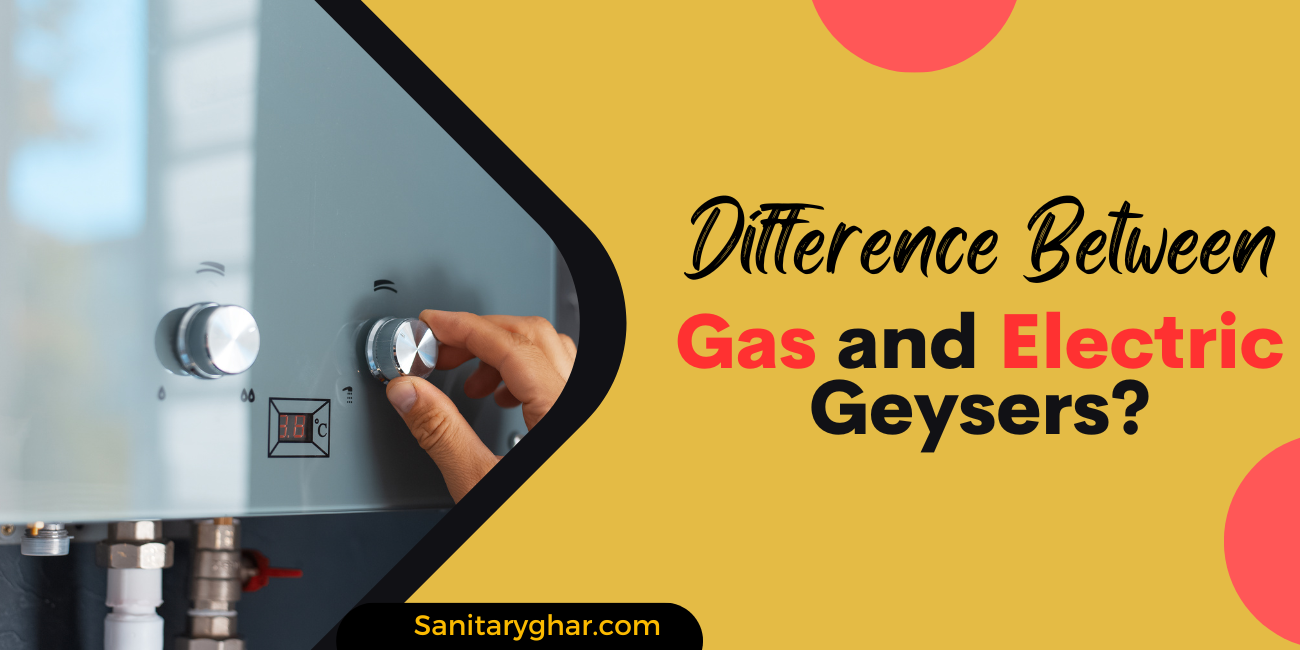What's the difference between gas and electric geysers?

Choosing between gas and electric geysers for your home's water heating can have a substantial impact on your energy expenditures, comfort, and convenience. Before making a decision, it is crucial to understand the differences between the two varieties of geysers, as each has its own advantages and disadvantages. This comprehensive guide will examine the primary differences between gas and electric geysers, including installation, cost, efficiency, and maintenance.
1. How They Work
Gas Geysers:
Natural gas or LPG (liquefied petroleum gas) is employed to heat water in gas geysers. A sensor detects the passage of water when a hot water tap is activated, thereby igniting the burner to instantly heat the water. Gas geysers are available in both tankless and storage varieties, providing the flexibility to accommodate your requirements.
Electric Geysers:
Electric geysers utilize electricity to heat water by means of an electric heating element that is located within the reservoir. The element automatically activates to reheat the water when the water temperature falls below a predetermined threshold. Additionally, these geysers are accessible in tankless and storage configurations.
2. Energy Consumption and Efficiency
Gas Geysers:
Especially in variants with a tankless design, gas geysers are recognized for their exceptional energy efficiency. They are the optimal choice for households with higher hot water consumption due to the minimal energy waste that results from heating water on demand. Nevertheless, the efficiency of gas geysers can fluctuate based on the model and the maintenance practices.
Electric Geysers:
Electric geysers are generally less efficient than gas models due to the fact that they are required to maintain a consistent supply of hot water, which results in standby energy losses. Nevertheless, contemporary electric geysers have become more energy-efficient due to their enhanced insulation and energy-saving features, rendering them a viable alternative for a significant number of households.
3. Comparison of Costs
Initial Cost Gas Geysers: In general, gas geysers have a higher initial cost, particularly on tankless varieties. Nevertheless, the investment may prove advantageous in the long term as a result of reduced operational expenses.
Electric geysers are a more cost-effective option initially due to their lower initial costs of purchase and installation.
Costs of Operation
Gas geysers: Gas is frequently less expensive than electricity, which results in reduced operating expenses for gas geysers. This is especially true in regions where natural gas is readily accessible.
The operational costs of electric geysers may be elevated as a result of the ongoing requirement to maintain the temperature of the water and the high cost of electricity.
4. Installation Considerations
Gas Geysers:
Proper ventilation and a connection to a gas line are necessary for the safe expulsion of combustion gases during the installation of a gas geyser. Residences that lack a gas supply can result in a more intricate and expensive installation process.
Electric Geysers:
Electric geysers are simpler and more cost-effective to install, as they necessitate only an electrical connection. They are appropriate for a broader range of locations within the home, as they do not require ventilation.
5. Longevity and Maintenance
Gas Geysers:
Due to the combustion process, gas geysers typically necessitate more frequent maintenance. It is imperative to conduct routine inspections of the ventilation system, burner cleaning, and gas leakage to ensure the safety of the operation. Nonetheless, gas geysers can endure for an extended period of time when maintained correctly, in contrast to their electric counterparts.
Electric Geysers:
Electric geysers necessitate lower levels of maintenance, with the primary emphasis on thermostat and heating element inspections. The absence of combustion reduces the likelihood of problems, resulting in a longer lifespan with little maintenance.
6. Environmental Impact
Gas Geysers:
Although gas geysers are more efficient, they do emit greenhouse gases during combustion. Nevertheless, gas geysers are a relatively eco-friendly alternative to coal or oil, as natural gas is a greener fossil fuel.
Electric Geysers:
The source of the electricity has a big impact on how environmentally friendly electric geysers are. Electric geysers may be a more environmentally friendly option if your electricity is generated from renewable sources. Nevertheless, the environmental impact may be greater if the electricity is produced using fossil fuels.
7. Final Thoughts:
If you have a large household with high hot water demands, access to natural gas, and are seeking long-term cost reductions, consider gas geysers. Gas geysers are also an excellent choice for those who prefer instantaneous hot water and possess the ability to ensure regular maintenance.
Select electric geysers. If you reside in an area where electricity is more dependable or affordable than gas, prefer a simplified installation, or are on a budget. Electric geysers are also appropriate for smaller households or those who are interested in reducing their carbon footprint through the use of renewable energy sources.






